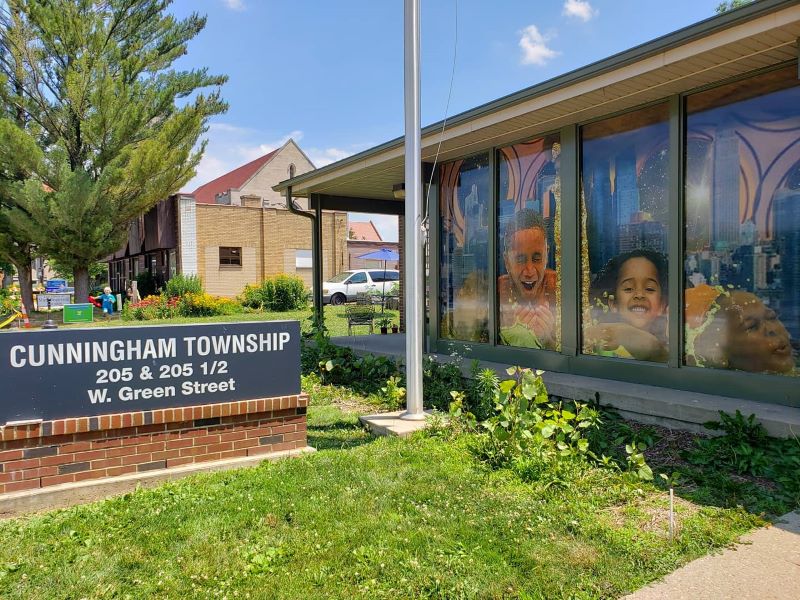Cunningham Township Supervisor’s Office has placed an Anti-Poverty Referendum on the ballot for Urbana voters to consider — one of several important decisions on this year’s ballot locally — where voters will be asked whether they want to:
“increase the Township levy specifically for the purpose of providing Assistance for Low-Income Households in need in Urbana (including, but not limited to, rental assistance, job transportation, and other life-saving assistance for those in need).”
Voting yes would mean Urbana residents would pay about $3 more a month to the Township (based on a house value of $100,000). The work that Cunningham Township has done for citizens most in need, particularly during these past several months with the added economic burdens caused by the pandemic, makes voting yes for this referendum the obvious choice.
But what is Cunningham Township, exactly? Cunningham Township encompasses the same boundaries as the the City of Urbana, and is responsible for issuing General Welfare assistance benefits to Urbana residents who are out of work or disabled, as well as providing grants to non-profits serving low income residents. They are working with the most vulnerable in Urbana, those whose basic needs are not being met. Here are a few stats, from the Township:
-
296 households received General Assistance, including 133 homeless and 170 disabled residents.
-
119 households avoided eviction with Rental Assistance. Two thirds of households were headed by women and over half those served were children.
-
14 local non-profits received Social Service Grants, including Crisis Nursery, Health Care Consumers, Rape Crisis, and the Refugee Center.
-
Over 1000 residents, or one in 40 Urbana residents served last year.
We wrote about the problem of poverty in Urbana last year, stating:
“Not having enough money is a problem many face, but to live in poverty or extreme poverty presents a host of other issues. We see the manifestations of poverty in food insecurity, crime, drug use, and school truancy. We see it in homelessness and in housing discrimination. When you don’t have enough money to cover all of your expenses, you are forced to make impossible decisions: Food or rent? Utilities or transportation to work? Your credit score suffers, and improving that is practically insurmountable if you don’t have the means to pay off debts. If you aren’t able to save any money, it makes finding a decent place to live difficult, as many landlords not only offer leases based on credit score and history of criminal convictions, but also often require a substantial downpayment in addition to the first month’s rent.”
The pandemic has only exacerbated that problem, shining an even brighter light on the disparities. Cunningham Township estimates that it will be serving more than 2,000 residents this year. Economic recovery is going to be long, and those who were already several steps behind have been shoved even further in the wrong direction. Since March, the Township has stepped up their efforts, adding even more services to ensure those most in need are provided for. Much of these added needs have been privately funded, through their Angel Fund, which was launched in 2018 to provide additional assistance for their clients beyond what their taxpayer funded services offer.
The Township joined forces with the Channing Murray Foundation in the spring to form the Bucket Brigade. They’ve been delivering hot meals, packaged food, and fresh produce to those facing food insecurity. As summer approached, they gathered several community partners to form Solidarity Gardens, “offering free seeds, seedlings, tools, soil, containers, miscellaneous supplies, gardening expertise, and educational resources to any interested party in the Champaign-Urbana area.” The effort enabled folks to grow food for themselves, or grow it to be donated and distributed to the community.
Community donations are wonderful — we should all feel inclined to give from our excess to help those who are struggling — but they are no substitute for the steady income that can be provided through taxes. The Township has been operating with a deficit since 2015, something that is just not sustainable given the immense needs they are working to address. While organizations and municipalities everywhere are having to face the reality of making budget cuts, that cannot be an option when making those cuts is going to add to rather than alleviate poverty. According to the Township, if the referendum fails, these are the cuts that would likely have to happen:
-
Reduce or Eliminate the Rental Assistance Program: We could cap the budget on Rental Assistance, but would likely run out of support mid-year.
-
Cut Social Service support: These grants to local nonprofits are used to extend Township services and are often used to leverage state and federal grants, so this move should be done carefully.
-
Shrink General Assistance: Although General Assistance is a state-mandated program, we could control costs by keeping payments at $300 per month instead of rising with inflation.
A community cannot fully thrive if it cannot take care of all of its citizens. Urbana residents should vote yes to support the tax levy. Champaign residents, our cities are intertwined. Even though you won’t be able to support this on your ballot, you can encourage your Urbana friends and family to do so.
You can read more about the Anti-Poverty Referendum here.
The Editorial Board is Jessica Hammie, Julie McClure, and Patrick Singer.








